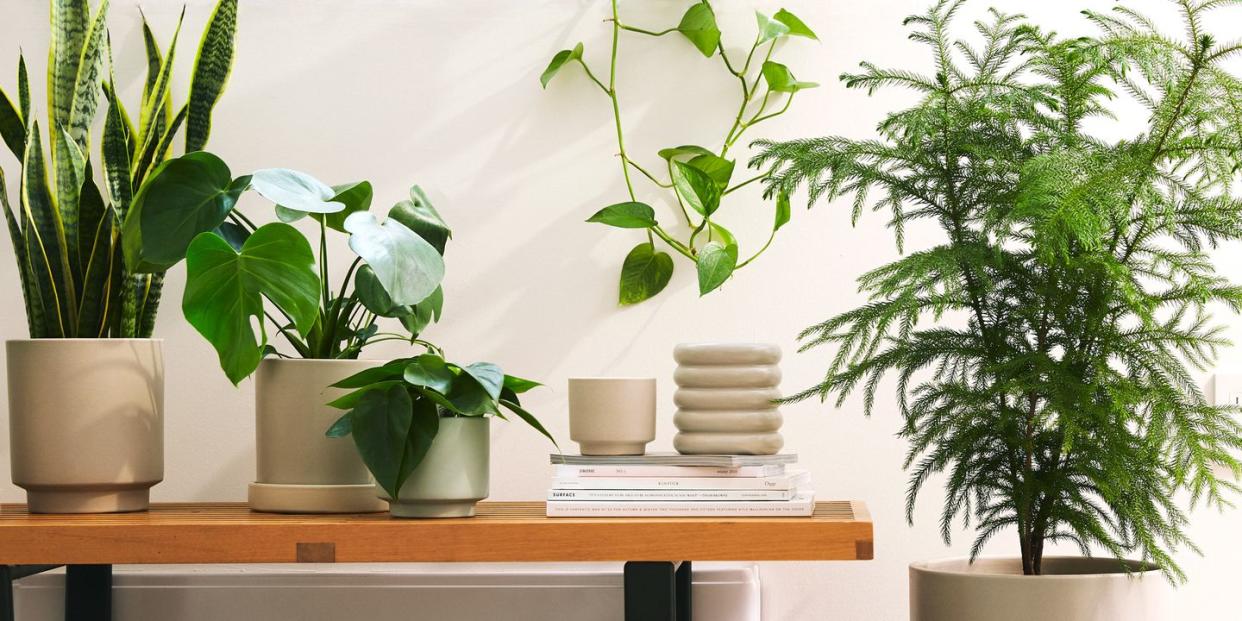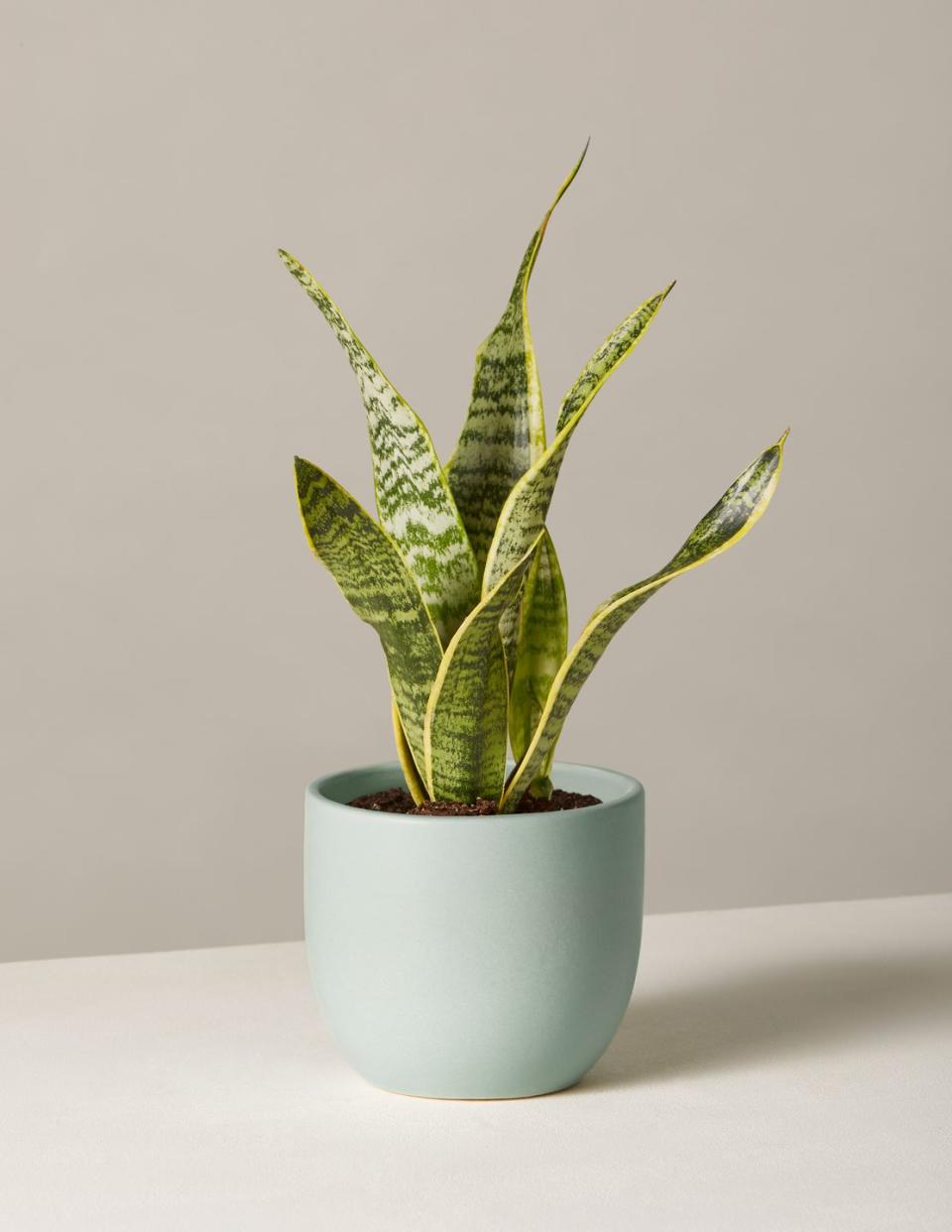The Scientific Way That Plants Decrease Stress in Humans

“Hearst Magazines and Verizon Media may earn commission or revenue on some items through the links below.”
When onetime personal plant shopper and aspiring "Martha Stewart of Succulents" Sonja Detrinidad opened her website, Partly Sunny Projects, in Southern California just weeks into the pandemic, she didn't have high hopes for it. Detrinidad figured people wouldn’t have the expendable income to spend on plants while they were instead scrambling to find groceries and toilet paper. But the opposite happened: She was flooded, shipping out 1,200 orders in June of 2020 alone. In the past year, Detrinidad estimates that she’s sent out more than 70,000 plants. Her success is just one example of increased time at home leading to an explosion in the houseplant industry.
Detrinidad, who runs a plant-focused TikTok account with over 285,000 followers, has clearly had an outsized impact on her customers; one wrote her a note that read: "Thank you again for sharing your videos on TikTok. Not to put pressure on you, but you have changed my life. I finally found something that helps me with my anxiety and sad days."
Detrinidad says that this is not the only note like this and admits she’s gotten many from customers talking about how plants have gotten them through particularly difficult times. "Where I live I have these great outdoor areas, but other people are trapped in a studio apartment in a city and can’t get out,” says Detrindad. “They want to see a tree. I think that it gave an opportunity to people that didn’t have a chance to slow down to slow down and really embrace the space that they live in."
Plus, Detrindad points out, houseplants can become a (healthily!) addictive hobby: "You buy one and then you see the leaves of another one and you see the color and shapes of another one and you buy another one,” she explains.
Teresa Thomas, co-owner of Crazy Plant Bae based in New Orleans, has a family history of green thumb plant enthusiasts, and says she's seenboth new and existing plant owners adding more greenery to their homes this year, with both in-person and online plant orders reflecting an unprecedented demand for plants. “There for sure is a correlation between homebound and the increase in plant interest,” says Thomas. “People have more time to devote to hobbies such as plants as well as they are looking to beautify their homes since they are spending more time than ever there. There is a huge increase in air purifying plants to provide some comfort I think with the uncertainty of air quality and contaminants.”

Alisa Richter, head of PR for The Sill, a online plant haven with retail locations in New York and California, also says that the company has seen a huge uptick in the past year. “At the height of the pandemic we saw an increase in site traffic and sales that far exceeded any expectations,” says Richter. “We have definitely noticed an increase in new customers and first time plant parents. People are spending more time than ever at home, and I think they are craving some greenery and looking for easy ways to enhance their space. Plants can make any environment feel more warm and inviting. For someone who owned only a plant or two before, the pandemic offered them an opportunity to grow their collection and make a hobby out of indoor gardening."
Last fall, the Sill conducted a poll in its Facebook group asking how members' “plant parenthood” had changed during the pandemic. This is just one example of a fairly common response: "I ordered my first 4 plants in April for something to do when everything shut down. Now I have 50 plants and they’ve helped me so much mentally during all this weirdness."
Active plant owners, whether new or old have been growing their collections at a rapid pace and the industry is trying to keep up. “The greenhouses that I visit in Southern California are like jungles. I could find these amazing specimens that had literally been in the greenhouses for probably 7-10 years,” says Detrinidad. “They were overgrowing and busting their pots. Today half the smaller greenhouses are empty. The owners cannot keep up with demand.”
"There has been an unprecedented demand for plants that is making it hard for growers to keep up," agrees Thomas.
The plant industry has been on the rise for a while; the UK's Garden Centre Association deemed 2019 the "year of the houseplant" with impressive year-over-year growth, but the pandemic further pushed the industry forward. According to the plant retailer Breck’s, while many industries suffered in 2020, the gardening industry saw close to 9% in growth last year, and a Nursery Management survey says that more than 50% of businesses experienced a bump in profits over 2019.
"Plants are in fashion right now, but COVID fast-tracked it," says Dr. Melinda Knuth, Post-doctoral Research Assistant in the Food and Resource Economics Department at the University of Florida. And there's good reason for that. Knuth specializes in researching the effects of plants, greenspaces and nature on humans, and was part of a recent study about the benefits of plants. "People who live in plant rich environments report a higher life satisfaction rating, more than people who don’t live in a plant rich environment," she says. "Adding more nature to our environment can have such a great impact and can change our mood and how we think."
Plants can improve your state of mind in a few ways, says Knuth, but the biggest is by decreasing your level of cortisol, the stress hormone in our body that is expressed in saliva. "We know that plants can decrease stress, because when people view even pictures of plants, fake plants or real plants, the cortisol level in their saliva drops," says Knuth. "So when people see plants, the stress hormone within our body actually decreases."
Knuth says that having plants and access to greenspaces has shown a correlation with decreased cardiovascular events, and that taking nature walks can help with memory health. She also says that students and employees who are in classrooms and workplaces with plants tend to perform better (read more about that here).
Related: You Should Be Using Biophilic Design to Set Up Your Home Classroom
"Students who are around plants actually test better on standardized testing than students who aren’t present in a classroom that has plants," says Knuth. "This productivity also translates into the workplace for adults. One study showed that there was a 30% decrease in sick leave for people who were in biophilic workplaces." Translation: Having lots of plants around is definitely a good move for those who are working from home or students being homeschooled.

Though experts are hesitant to cite a direct correlation from the experiment's controlled environment to everyday homes, one oft-cited NASA study suggests that plants can also act as a natural air purifier. "Houseplants can scrub the air of toxins in our environment, so having houseplants present in your home actually makes your air cleaner," says Knuth. "When we run our furnace or gas oven or stove, there are contaminants in the air and the plants can scrub the air and make it cleaner for you to breathe."
If you're among the droves of people who are enjoying the mental and physical health benefits of surrounding yourself with plants, don’t beat yourself up if one (or a few!) doesn’t make it. “I am a firm believer that a green thumb comes through cultivation,” says Richter. “Plants take practice, just like anything else. So don’t be too hard on yourself when you accidentally kill a plant or two. It happens. Honestly, I still kill plants accidentally, especially if they are new varieties I haven’t grown before.”
Detrinidad agrees: “Doctors practice medicine and lawyers practice law and you should allow yourself the practice it takes to sustain a plant native to South Africa that you are trying to desperately cultivate in a bleak Ohio winter. Tending to plants is an exercise in patience and learning. Be invested in taking care of it, but if it dies, go get another one. And do not let this be the thing that gets your mood down.”
Need some help? Check out our guide to caring for houseplants!
You Might Also Like
